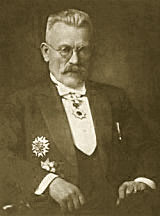Gustaf John Ramstedt

Gustaf John Ramstedt (October 22, 1873 – November 25, 1950) was a
Biography
Ramstedt was born in
As an undergraduate, he attended the University of Helsinki, where he studied Finno-Ugric languages under Eemil Nestor Setälä. He was later attracted to the study of Altaic languages and went to Mongolia to study the Mongolian language at the suggestion of Otto Donner. He later became professor extraordinarius in Altaic languages at the same university.
During his expeditions in Mongolia, Ramstedt become a personal friend to highly educated
In 1912, when Ramstedt was in
Following the independence of Finland in 1917, he became
Ramstedt's actions in Japan played a part in resolving the Åland Islands dispute. While stationed in Tokyo he provided a detailed memo about the Finnish view of the situation for use of the Japanese delegation in the League of Nations. Japan sided with Finland on the matter and consequently provided important support.[1]
Ramstedt is one of the earliest
Ramstedt was a pioneer in the study of numeral etymologies of a number of Asian language families (Turkic, Mongolian, Tungusic, as well as the possible isolate Korean).[4] He also did extensive work on the general etymological history of Korean.
Ramstedt died in Helsinki.
Publications
- Bergtscheremissische Sprachstudien, Helsinki, 1902 (Hill)
- "Über die Zahlwörter der altaischen Sprachen," JSFOu 24: 1–24, 1905
- Kalmückisches Wörterbuch, Helsinki, 1935
- "Studies in Korean Etymology," MSFOu 95, Helsinki: Suomalais-Ugrilainen Seura, 1949
- A Korean Grammar. Helsinki: Suomalais-ugrilainen Seura, 1939.
- Einführung in die altaische Sprachwissenschaft, 'Introduction to Altaic Linguistics', 2 volumes. Helsinki: Suomalais-Ugrilainen Seura, 1952–1957.
References
- Poppe, Nicholas. "Obituary: Gustav John Ramstedt 1873–1950." Harvard Journal of Asiatic Studies 14, no. 1/2 (1951): 315–22.
- Halen, Harry. Biliktu Baksi. The Knowledgeable Teacher. G.J. Ramstedt's Career as a Scholar. Mémoires de la Société de la Finno-Ougrienne, vol. 229, Vammala: Finno-Ugrian Society 1998.
Notes
- ^ G.J. Ramstedt: Lähettiläänä Nipponissa, pages 57.-59.
- ^ a b Jouko Lindstedt: Lingva Tereno: Scientisto, diplomato, esperantisto (part 2)
- ^ Board of Finnish Esperanto Society
- ^ Krippes, Karl, 1992, "The Phonetic History of Korean Numerals," Korean Linguistics 7:1–9
